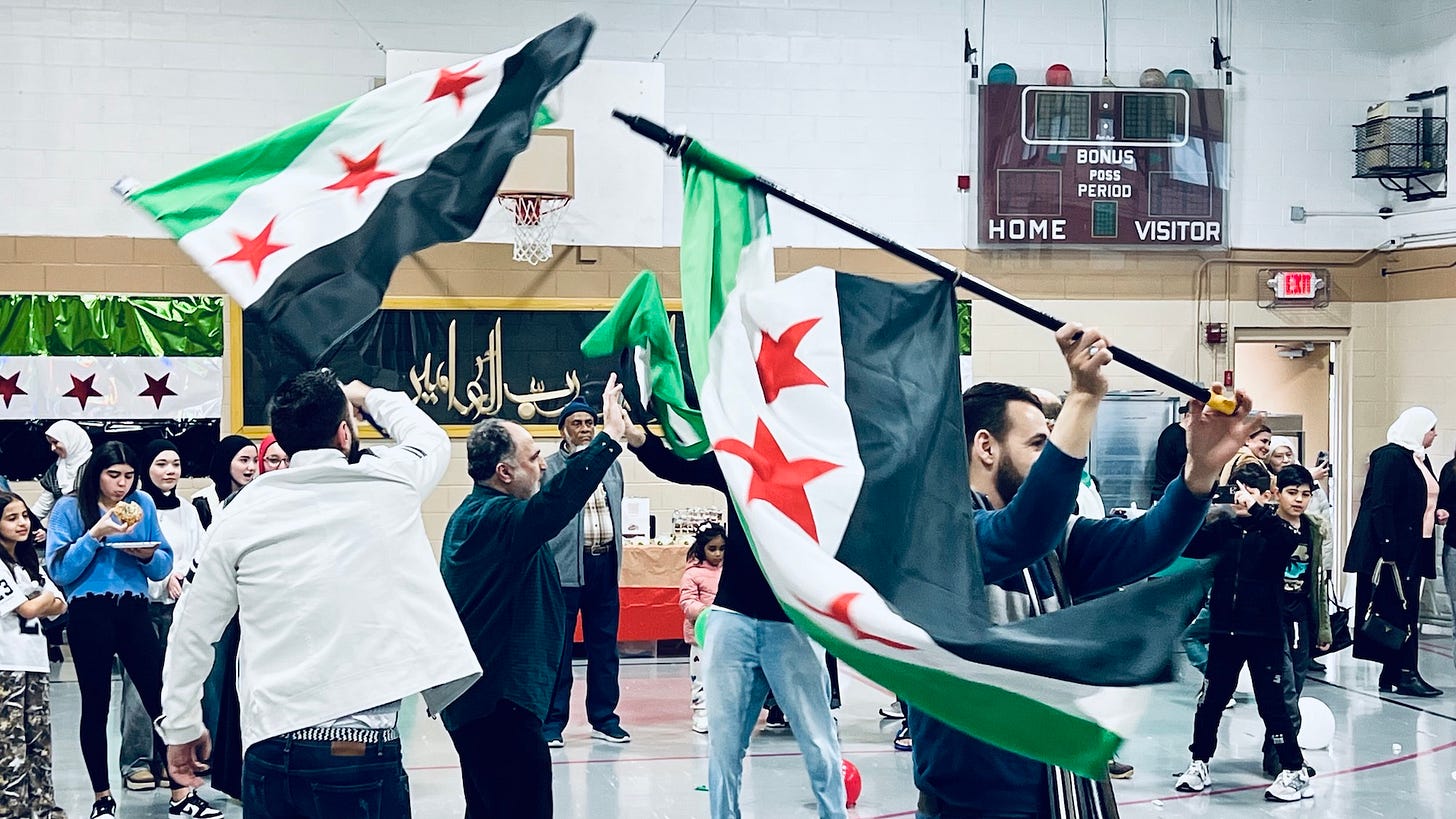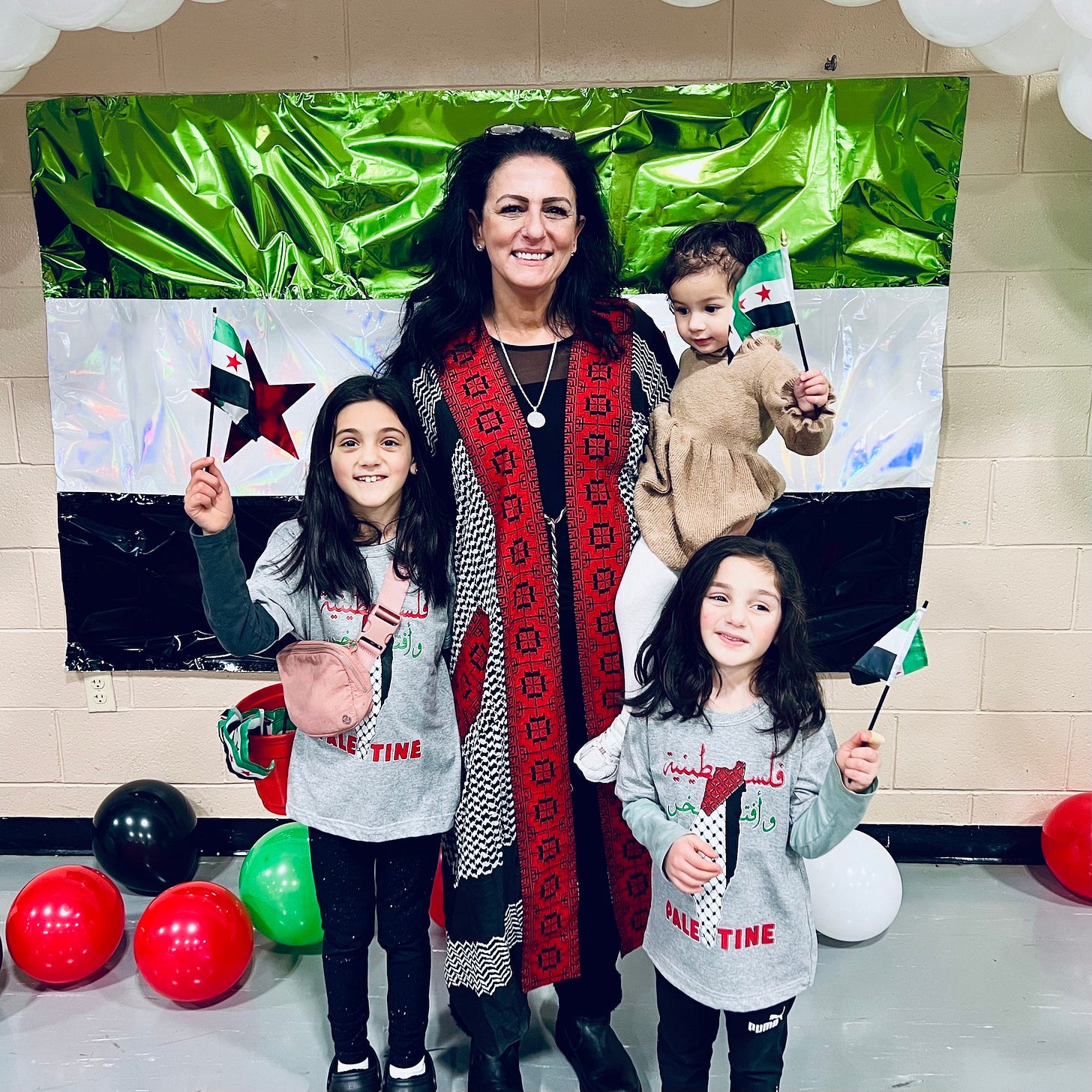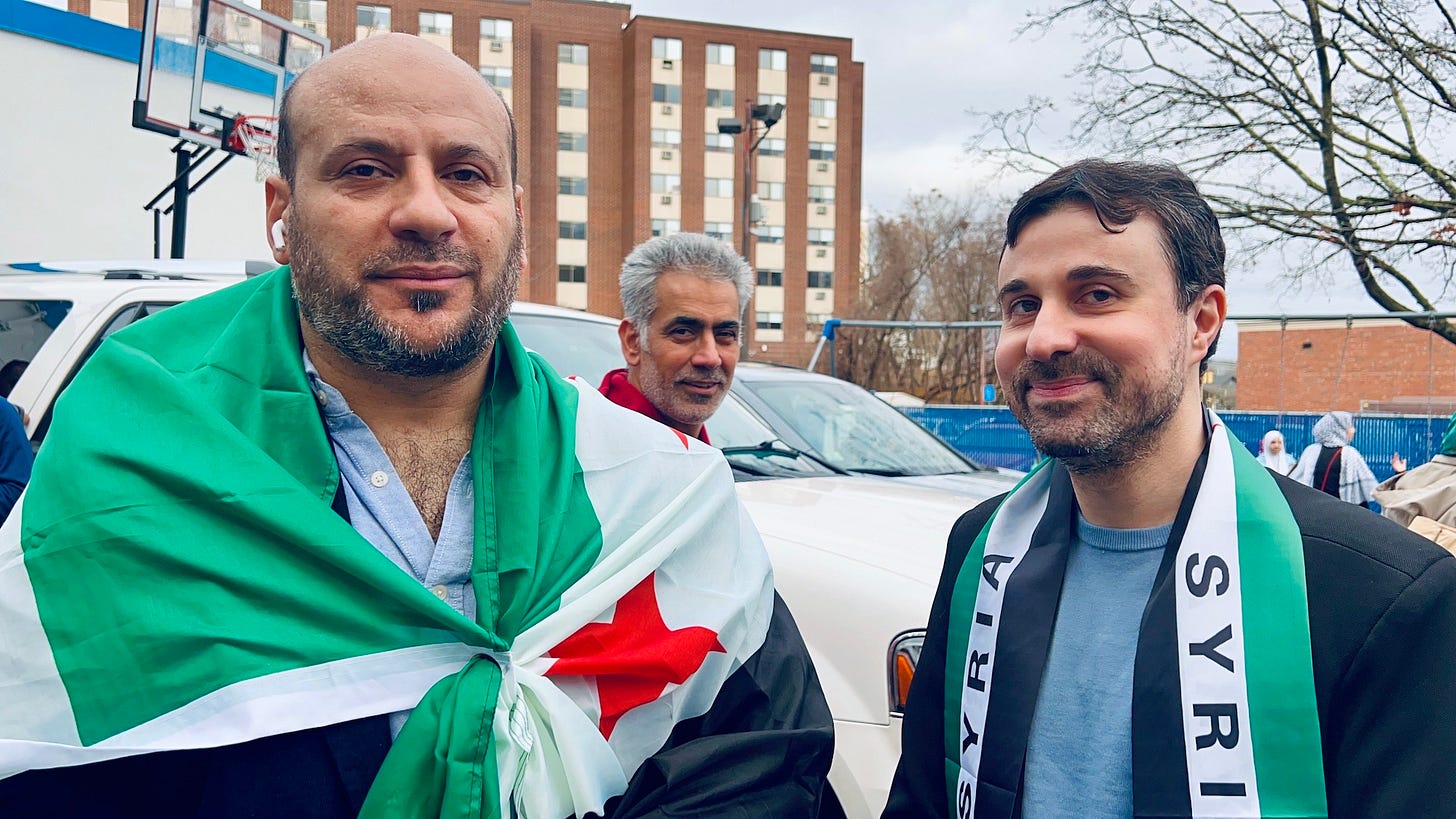Syrians and their allies celebrate liberation in Rhode Island
"We’re celebrating every day for the rest of our lives," said organizer Sterk Zaza. "Until all countries and oppressed people are free."
On Sunday afternoon, I spoke with Sterk Zaza, an advocate for refugees, immigrants, and Palestinian freedom, about the Syria Liberation Celebration at the Islamic School of Rhode Island. Around 300 people, mostly Syrian refugees and families, were celebrating, dancing, singing, and enjoying food inside. Zaza was born in Damascus, Syria, and came to the United States at seven years old in 1979.
“We pray that Syria will grow again and be rebuilt,” said Zaza. “There were many lives lost, but their lives weren’t lost in vain. We pray for them and pray for the people in Syria - that they can walk the streets and feel liberated and enjoy life as we are supposed to.”
Steve Ahlquist: Celebrations like this are happening worldwide right now.
Sterk Zaza: Celebrations are happening everywhere. They started the day we heard the news. We’re celebrating every day for the rest of our lives—until all countries and oppressed people are free.
Syrians have been under great oppression for over 50 years. We are so pleased and happy that they are finally free and liberated and can begin their new lives with trust in a new government, God willing. We wanted to celebrate in Rhode Island because we have a very large Syrian community here. I welcomed Syrian refugees back in February of 2016, the first family that arrived from Syria.
It’s liberating to see everyone here and to know that their families are now free—or in the process of full freedom. We are so happy to celebrate them, and God willing, Palestine, Sudan, and Congo can soon join.
Steve Ahlquist: What does this mean to the 300+ people here?
Sterk Zaza: Happiness, freedom, liberation. Finally, after over 50 years of oppression under the Assad regime, he’s gone. It will be an uphill battle, but the country will be rebuilt. The lives lost were not lost in vain. They are our martyrs; God rest their souls. Almost everyone, if not everyone here, has lost a close family member or friend through the war in Syria since 2011.
Steve Ahlquist: It seemed endless, and suddenly, it just ended.
Sterk Zaza: The night we heard about it, I was laying in bed reading the news, and I made phone call after phone call to Syria - and my family was able to answer. They were like, "We’re free. Today’s the day." And everyone was crying with joy through tears.
I knew this day would come because justice prevails. We just never know when. We never knew when it would be for Syria. We didn’t realize it would last so long in Syria and in all the other countries—particularly Gaza right now—but we will see justice. We will see justice.
Steve Ahlquist: What happens now?
Sterk Zaza: I don’t know the political aspects of it, but I understand from speaking to family and friends that they feel safer. They’re able to walk the streets without fear. There is no corruption as there was during the Assad regime. People are free to walk the streets and have freedom of speech. They can speak about President Bashar al-Assad. They can talk about Bashar. They can swear at Bashar. They do not live in fear.
I spoke with Waseem Bahra, a political science major at the University of Rhode Island.
“This is a beautiful day for anyone who has the honor and the beauty of being part of the new nation, Syria. There are a lot of tensions right now in the area, and there are a lot of fears about what will happen and that the government will take shifty turns. Does Turkey support it? What’s the fate of this country? Many people are concerned, and I just want to say to anyone concerned about the new direction that this country will take: We are in the midst of a tremendous historical period, and we are quite literally witnessing the birth of a new nation. It’s unbelievable.
“I want to emphasize that this came at no cheap price. Many people were killed, many children were locked up, and many women were violated as a consequence of this criminal regime. This revolution may seem spontaneous, and the government may have seemed to fall in one week, but it took more than 52 years of suffering, bloodshed, and pushing back.”
“The resistance was pushing back constantly,” I said.
“Yeah, agreed Bahra. “We are at the door of a new future, and when we hear such knocks, I think it is our duty to answer them and welcome all possibilities.”
Last, I spoke to Ahmad Kalaji. His friend, Abdullah Kanaan, was kind enough to translate our conversation.
Ahmad Kalaji: After 53 years of killing and bloodshed and prisons - it is so important, not only inside Syria but worldwide, to celebrate this victory.
Steve Ahlquist: Do you have family in Syria?
Ahmad Kalaji: Some members of my family are still in Syria.
Steve Ahlquist: And how are they reacting? They must be feeling pretty good right now.
Ahmad Kalaji: With the regime’s collapse, for the first time, we feel free.
Some people were in prison for decades, 30 or 40 years. The Assad regime used some prisoners and sold their organs to other countries.
Steve Ahlquist: You came to America ten years ago with your family. What was your journey like?
Ahmad Kalaji: We fled the country to Jordan and stayed there for four and a half years. Then we came to America. I want to thank all the countries and people around the world who helped the Syrians, even with just a smile, because life in the camps was so miserable. It was a disaster.
I thank God for the collapse of this regime. We just spoke the truth because we wanted our children to live a brighter future.
Steve Ahlquist: Now that Syria is free, do you think you might go back?
Ahmad Kalaji: I have connections here now. I have been here for 10 years. I’m not thinking about going back home. I feel safe here. We have a new government in Syria, but it’s not 100% safe.









Wish I had seen this sooner. I live right around the corner. Would have loved to have joined in the celebration. May Syria re-form uncorrupted by foreign governments and others. Bless the Syrian people!!